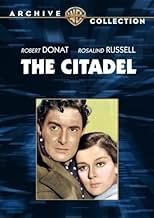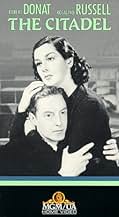NOTE IMDb
7,0/10
2,5 k
MA NOTE
Un jeune médecin enthousiaste se lance avec joie dans sa carrière, mais il ne tarde pas à découvrir ce qu'implique réellement le métier de médecin.Un jeune médecin enthousiaste se lance avec joie dans sa carrière, mais il ne tarde pas à découvrir ce qu'implique réellement le métier de médecin.Un jeune médecin enthousiaste se lance avec joie dans sa carrière, mais il ne tarde pas à découvrir ce qu'implique réellement le métier de médecin.
- Réalisation
- Scénario
- Casting principal
- Nommé pour 4 Oscars
- 9 victoires et 4 nominations au total
Penelope Dudley-Ward
- Toppy LeRoy
- (as Penelope Dudley Ward)
Francis L. Sullivan
- Ben Chenkin
- (as Francis Sullivan)
Avis à la une
This film features an excellent cast, ably led by Robert Donat in a performance that is superior to his marvelous performance one year later in Goodbye, Mr. Chips. As a young doctor, he begins with the highest intentions, gradually becoming cynical and disillusioned. He decides it's better to have money than scruples, with predictable results. Outstanding work as well by Rex Harrison and Rosiland Russell and a very good script. Most recommended.
A.J. Cronin's book "The Citadel" was adapted for a 1938 film starring Robert Donat, Rosalind Russell, Ralph Richardson, Rex Harrison, and Emlyn Williams, directed by King Vidor.
Donat plays Andrew, a young, idealistic new doctor who goes to work in a small Welsh mining town, where he marries a pretty schoolteacher, Christine (Rosalind Russell). Many of the miners have a persistent cough, and he becomes interested in finding the cause. But the miners have little understanding of the big picture and just want the "pink medicine" the old doctor gave them, which just helped their symptoms.
Thwarted at every turn, Andrew and Christine move to London, where Andrew opens a practice. Then he has a change of fortune when he runs into an old friend (Rex Harrison) who gets him on the society doctor track, where he gets big money for treating hypochondriacal patients and by merely being present while a surgery is being performed, or taking a referral.
A beautiful movie with the underrated Donat turning in a wonderful performance of quiet intensity. Russell's expressions say more than her words - you know exactly how she's feeling. Ralph Richardson -- was he ever bad? - plays Andrew's old friend Denny, who notices the change in Andrew's goals.
A.J. Cronin was one of the authors whose novels were often adapted for film in the old days: "The Spanish Gardener," "The Green Years,", "Keys of the Kingdom," "Bright Victory," "Vigil in the Night," and others. Some of his stories involve medicine/science and sacrifice/dedication. Those books made for some inspiring films in the '30s and '40s.
Donat plays Andrew, a young, idealistic new doctor who goes to work in a small Welsh mining town, where he marries a pretty schoolteacher, Christine (Rosalind Russell). Many of the miners have a persistent cough, and he becomes interested in finding the cause. But the miners have little understanding of the big picture and just want the "pink medicine" the old doctor gave them, which just helped their symptoms.
Thwarted at every turn, Andrew and Christine move to London, where Andrew opens a practice. Then he has a change of fortune when he runs into an old friend (Rex Harrison) who gets him on the society doctor track, where he gets big money for treating hypochondriacal patients and by merely being present while a surgery is being performed, or taking a referral.
A beautiful movie with the underrated Donat turning in a wonderful performance of quiet intensity. Russell's expressions say more than her words - you know exactly how she's feeling. Ralph Richardson -- was he ever bad? - plays Andrew's old friend Denny, who notices the change in Andrew's goals.
A.J. Cronin was one of the authors whose novels were often adapted for film in the old days: "The Spanish Gardener," "The Green Years,", "Keys of the Kingdom," "Bright Victory," "Vigil in the Night," and others. Some of his stories involve medicine/science and sacrifice/dedication. Those books made for some inspiring films in the '30s and '40s.
"The Citadel" is one of those circular morality fables - idealistic young man sets out full of good intentions to put the world to right, but, finding his dreams dashed by prejudice and ignorance, throws in his lot with the protection of an easy but dishonest life only to realise the error of his ways through personal tragedy with consequent redemption. A;though stylistically and culturally a world apart, it is thematically a precursor of Mizoguchi's "Sansho Dayu". Made in great Britain in 1938, its MGM backing certainly shows in higher production values than most home grown films of the period - and this in spite of much reliance on back projection of the sort that even the great Carol Reed could not always effectively disguise. One of Hollywood's top directors, King Vidor, invests it with visual quality and, in a part that could have been tailored for Greer Garson, Rosalind Russell makes a surprisingly convincing female lead, supporting the hero throughout his tribulations with every ounce of Garsonian understanding he needs. But it is Robert Donat as the idealistic doctor, who first tries his professional hand in the dark Welsh colliery valley, that is the film's greatest strength. Here was an actor who brought a sense of dignity and integrity to every role he undertook from the earliest Richard Hannay to the Chinese nobleman in "The Inn of the Sixth Happiness" which he was brave enough to play when he was literally gasping for breath. His performance in "The Citadel" is not entirely free from cliché but I imagine this was something imposed by the conventions of the period. How else to explain that when he becomes mean and mercenary he suddenly sports a very short and unsympathetic moustache which, if memory serves me right, miraculously disappears for the final scene of redemption. For the rest there is a galaxy of British acting talent to be found among the supporting roles with a brief glimpse of the dignified Nora Swinburne and a few more of a youthful Francis L. Sullivan doing his obese bigot stuff with rather less brains than usual. And as if this was not all, there is "Sexy Rexy" Harrison gracing the Harley Street scene, Cecil Parker playing a particularly odious surgeon who would no doubt be struck off the Medical Register if he were around today and the great Ralph Richardson investing the role of Donat's best friend with just about the right amount of Shakespearean rhetoric that the part will support. All in all a veritable treat provided you suspend just a little bit of disbelief.
I found the performances of Donat and Russel fascinating so many years after the film was made. A J Cronyn's story is relevant even today and that makes the film entertaining. King Vidor needs to be complimented on getting such wonderful performances out of the leading pair as well as Rex Harrison and Ralph Richardson. Mary Clare as Mrs Orlando was also an interesting though brief performance. Harry Stradling's camerawork is impressive, if taken in perspective of the film's vintage.
What is a shame is that Rosalind Russel was not picked up by good directors for meaty serious roles, after this noteworthy performance.
What is a shame is that Rosalind Russel was not picked up by good directors for meaty serious roles, after this noteworthy performance.
Very good film from King Vidor with a great look and a mostly excellent cast, take from the classic novel by A Cronin. Robert Donat as Dr. Manson, a highly-principled physician who struggles with the conflicting demands of his profession, provides an uneven central performance. It is sometimes hard to understand his motivations and this is the film's biggest weakness. Rosalind Russell does a fine job as his ever-faithful, often suffering wife. Her performance is perfect, and does provide a moral core to the film. The film wisely avoids a lot of details of the novel that would have muddied up the storyline. (In the book, Dr. Manson has an affair with one of society patients.) The film also boasts some fine performances from a very young Rex Harrison and Ralph Richardson. In fact, Richardson's role as an idealistic, though flawed doctor steals the spotlight every time he is on the screen. The film also has a great look, especially the outdoor scenes of the British villages.
Le saviez-vous
- GaffesWhen Andrew examines Christine's throat, he sits in front of a light that is supposedly reflected into Christine's mouth by his eyepiece. We see this from over Andrew's shoulder, and when the light is directed into her mouth, it is clearly coming from behind Andrew, because the back of his eyepiece is illuminated.
- Citations
Christine Barlow Manson: Andrew, Do you remember once telling me that a all good research man needed was a notebook, a microscope and a room with a roof over it?
- Crédits fousPrologue: "This motion picture is a story of individual characterizations and is in no way intended as a reflection on the great medical profession which has done so much towards beating back those forces of nature that retard the physical progress of the human race."
- Versions alternativesAlso shown in computer colorized version.
- ConnexionsFeatured in The Ultimate Film (2004)
Meilleurs choix
Connectez-vous pour évaluer et suivre la liste de favoris afin de recevoir des recommandations personnalisées
- How long is The Citadel?Alimenté par Alexa
Détails
- Date de sortie
- Pays d’origine
- Langue
- Aussi connu sous le nom de
- La ciudadela
- Lieux de tournage
- Abertillery, Blaenau Gwent, Pays de Galles, Royaume-Uni(Village scenes)
- Société de production
- Voir plus de crédits d'entreprise sur IMDbPro
- Durée1 heure 50 minutes
- Couleur
- Rapport de forme
- 1.37 : 1
Contribuer à cette page
Suggérer une modification ou ajouter du contenu manquant






































